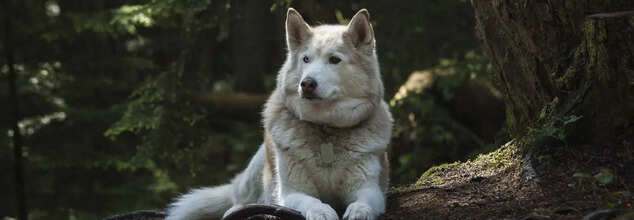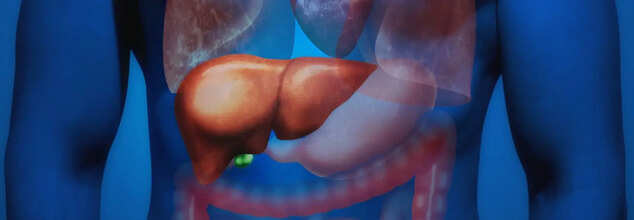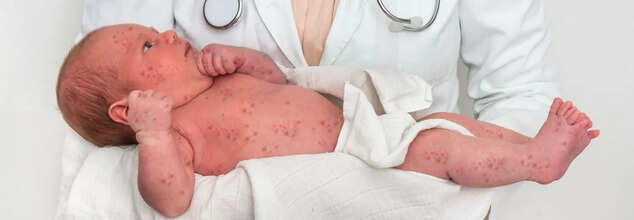- Health Conditions A-Z
- Health & Wellness
- Nutrition
- Fitness
- Health News
- Ayurveda
- Videos
- Medicine A-Z
- Parenting
- Web Stories

Werewolf Syndrome (Credit: Canva)
Dogs In Europe Affected By Werewolf Syndrome: Can It Transfer To Humans?
British health authorities have warned dog owners to avoid feeding their pets with certain dog chews imported from China. The warning by the United Kingdom's Food Standards Agency (FSA) came after the European Union (EU) predicted a possible link between dog food and a rare and alarming condition known as "werewolf syndrome." The alert was raised after a dog died in the Netherlands after eating products of Barkoo and Chrisco brands. Meanwhile, symptoms such as panic attacks, aggression, spasms and epileptic fits have been noted in many dogs across several countries.
What Is Werewolf Syndrome?
All the Chinese treats are potentially linked to dogs experiencing what is known as Werewolf Syndrome in dogs. The symptoms of this condition include:
- Panic Attacks
- Aggression
- Spasms
- Epileptic Fits
- In some extreme cases, death
Amidst the outbreak, FSA has included advice for pet owners. They have asked people to stop feeding their pet dogs with the affected chews immediately. The products include Barkoo kaustange natur 29 cms, Barkoo kauknochen, geknotet natur 11cm, Barkoo Kauknochen geknotet 24cm, Barkoo Kauknochen geknotet mit Spirulina 12cm, Chrisco Products include Chrisco Tyggeruller med kylling & kyllingelever, 100g, Chrisco Tyggeruller 18 stk. - hvide, Chrisco Massive politistave, 2.stk. - brune,
Chrisco Massive politistave, 2stk. - hvide, Chrisco Tyggerulle m. kylling & kyllingelever, 1stk.
Also, if the dog is unwell and has been fed any of the dog chews listed, the owner should seek veterinary advice and provide detailed information to the vet about the foods and treats the dog has been fed.
"While there is no confirmed distribution of affected products to the UK, there is the possibility that some consumers may have purchased these online from international sellers," Tina Potter, head of incidents at the FSA said in a statement. "No unsafe dog chews have been identified but, based on international investigations so far, we are advising dog owners to avoid feeding the affected chews to dogs as a precaution," she added.
Can It Be Transfered To Humans?
No, there is no evidence that dog Werewolf syndrome can transfer to humans (Zootonic transfer).
What Is Causing Werewolf Syndrome In Dogs?
According to the Dutch Food and Consumer Product Safety Authority (NVWA), contaminated batches are thought to contain harmful substances. Researchers currently suspect that chew bones, chew snacks and chew sticks may have been contaminated with mycotoxins (mould toxins) during the production process.
While no definitive contamination cause has been identified, early theories could also suggest the symptoms might be linked to chemical residue, bacterial toxins or allergens in the products. Experts have ruled out infections, vaccinations and tick remedies as the cause in affected dogs at the University Animal Hospital in Utrecht.

Credits: Canva
A New Blood Test Predicts Fatty Liver Disease 16 Years Ahead Of Diagnosis
Fatty liver disease, now called metabolic dysfunction-associated steatotic liver disease (MASLD), happens when extra fat builds up in liver cells without alcohol being the cause. Normally, the liver contains some fat, but if more than 5–10% of the liver’s weight is fat, it is considered a fatty liver. In its advanced stage, MASLD can develop into metabolic dysfunction-associated steatohepatitis (MASH), causing swelling and serious damage to the liver. Alarmingly, MASLD affects about 100 million people in the United States, including a growing number of children.
The disease often develops silently. Many people do not experience symptoms early on, but if it worsens, signs like fatigue, abdominal pain, jaundice, swelling, and even mental confusion may occur. Risk factors include obesity, diabetes, high cholesterol, rapid weight loss, poor eating habits, and certain medications.
A Breakthrough in Early Prediction
A new study offers hope for earlier detection. Researchers, led by Dr. Shiyi Yu from Guangdong Provincial People's Hospital in China, have developed a blood test that looks for five specific plasma proteins to predict MASLD years before symptoms show up. The findings are set to be presented at the Digestive Diseases Week meeting in San Diego.
The test was shown to be 84% accurate at predicting fatty liver disease five years in advance and 76% accurate at predicting it 16 years ahead of diagnosis. When additional factors like body mass index (BMI) and daily exercise habits were added, the prediction accuracy improved even more—over 90% at five years and 82% at 16 years.
This model was tested on two different groups—participants from the UK Biobank (over 50,000 people) and a separate group in China—showing promising results across diverse populations.
Why Early Detection Matters
Fatty liver disease not only damages the liver but also increases the risk of early death—primarily from cardiovascular diseases (CVD) rather than liver failure itself. The connection between MASLD and heart disease is strong, as both share causes like high blood sugar, high triglycerides, and obesity. That is why early diagnosis is crucial—not just to protect the liver, but also to manage the risk of heart disease.
Early identification through a simple blood test could lead to earlier lifestyle changes, medical monitoring, and interventions that can prevent serious complications like cirrhosis or heart attacks.
What You Can Do
Currently, there is no approved medication for MASLD. Treatment mainly involves:
- Maintaining a healthy weight through diet and exercise
- Controlling diabetes and cholesterol levels
- Avoiding alcohol
- Following medical advice if already diagnosed
Preventive steps include eating a balanced diet rich in lean proteins, fruits, vegetables, whole grains, and healthy oils, being physically active, and avoiding unnecessary medications.
Although the findings are considered preliminary until published in a peer-reviewed journal, this research marks a major advancement. It shows that a simple blood test could soon help millions of people know their risk decades in advance, giving them a chance to change the course of the disease before it's too late.

Credits: Canva
Why Is There A Growing Misinformation On Measles?
As the United States experiences the worst measles outbreak in over a decade with nearly 900 reported cases across 29 states, including deaths of two children, public understanding of the disease and its prevention strategy have been highly misunderstood due to political divide. The outbreak began in West Texas and has now spread widely. This highlights not only the persistent threat of measles but also the growing influence of vaccine misinformation, which have been fueled by political figures.
Why Is There A Resurgence of Preventable Diseases?
Measles, a highly contagious viral disease, had been largely controlled in the U.S. thanks to the widespread use of the measles, mumps, and rubella (MMR) vaccine. However, gaps in vaccination coverage have led to a resurgence. The current outbreak, centered in Texas but extending to almost 30 states, has alarmed public health officials. Two young girls who were otherwise healthy have died as a result of measles complications.
The disease is known for its rapid transmission. A single case can lead to significant spread if vaccination rates in a community fall below the 95% threshold needed for herd immunity. Children are particularly vulnerable; although the first dose of the MMR vaccine is typically administered at 12 months, increased parental concern has led some to seek earlier vaccination during the outbreak.
The Politics Of Vaccine
As per a new survey by KKF, a nonprofit health information group, only one-third of Republican-leaning parents were aware of the current measles outbreak. This was in comparison with the two-thirds of aware Democratic parents. The survey also found and 1 in 5 Republicans believes that measles vaccine is more dangerous than the diseases itself, this is double the rate of Democrats.
These gaps in perception are not new but are deepening. About 35% of Republicans surveyed believe the discredited theory that the MMR vaccine is linked to autism—a belief held by just 10% of Democrats. While belief in this theory has not increased significantly, public awareness of the claim has grown, reflecting the impact of persistent misinformation.
Adding to the confusion is Health and Human Services Secretary Robert F. Kennedy Jr., who has long been associated with anti-vaccine rhetoric. Since taking office, he has supported an investigation into environmental contributors to autism and has floated unproven theories, such as vitamin A being a preventative measure against measles. These statements, while not outright opposing vaccines, muddy public understanding and can discourage immunization.
At a time when clear public health messaging is critical, conflicting remarks from top officials are exacerbating distrust. Advocacy organizations like Immunize.org and The Immunization Partnership warn that such mixed messaging, especially when it originates from high-ranking leaders, undermines public confidence in vaccines.
In southern states like Texas, Louisiana, Arkansas, and Oklahoma, anti-vaccine activism has gained traction within state legislatures. Studies show that even lawmakers with medical backgrounds have not always supported public health measures, often influenced by political considerations and public pressure. Testimony from vaccine opponents at legislative hearings further amplifies misinformation, making it more difficult for facts to gain traction.
Meanwhile, healthcare providers are seeing the consequences firsthand. In California, where a 2014–15 outbreak began at Disneyland, pediatricians have treated severely ill children and taken stricter stances on accepting unvaccinated patients. These outbreaks serve as a stark reminder that the threat of measles is real and recurring.

Credits: Canva
IBS Awareness Month: Could Gravity Be Wrecking Your Digestive Health?
Every year in April, IBS Awareness Month puts the spotlight on one of the world's most misunderstood and elusive gastrointestinal disorders—Irritable Bowel Syndrome (IBS). Affecting about 10% of the world's population, IBS has puzzled physicians and researchers for years. Though its chronic and interruptive symptoms—abdominal pain and bloating on one end, constipation and diarrhea on the other—there remains no agreement on what actually triggers it. A new, daring theory is disrupting conventional wisdom by posing an unusual question- Is gravity the hidden culprit behind IBS?
Dr. Brennan Spiegel, a Cedars-Sinai Medical Center physician and researcher in Los Angeles, is leading the way to a new perspective on IBS—one that looks at the constant pull of gravity on our bodies. In the American Journal of Gastroenterology, Spiegel's theory is that IBS could be the body's failure to successfully deal with gravity.
It's an interesting concept. "We spend our whole life in gravity, are formed by it, but barely appreciate its constant effect on our body," Spiegel explained in an interview. "Each strand of our body is touched by gravity every day, from the top of our head to our gastrointestinal tract."
From a scientific perspective, this hypothesis borrows from evolutionary biology and neurophysiology. The human body over millennia has evolved complex systems—musculoskeletal, gastrointestinal, neurological—to deal with the downward pull of gravity. When these systems fail, Spiegel argues, they can initiate not only gastrointestinal symptoms but also a cascade of other complaints—muscle pain, fatigue, changed mood, and more.
What is the Gut-Brain Axis and the Roller Coaster Effect?
At its core is the connection between the gut and the brain—a widely documented characteristic of IBS. Individuals with IBS tend to experience a knotted stomach upon stress or a sensation of "butterflies" in stressful situations. Such gut feeling, as Spiegel speculates, may be attributed to the nervous system's adaptation to threats from gravity, such as the free-falling experience on a roller coaster.
"Our nervous system has mechanisms for perceiving and reacting to changes in gravity," he added. "When it flakes out or overcompensates, it may show up as IBS symptoms." This is related to another fascinating twist: the difference between individuals' reactions to gravitational stress. There are those who love roller coasters; others get nauseated or frantic—implying a continuum of what Spiegel refers to as G-force vigilance.
This might explain why IBS tends to overlap with disorders such as anxiety, depression, fibromyalgia, and chronic fatigue syndrome—all of which could potentially have an underlying sensitivity to gravitational stress.
Link Between IBS and Gravity
Spiegel's theory also explores deeper into anatomy. The abdominal cavity houses heavy organs that need to be "suspended" effectively. Genetic predispositions—lax connective tissues, a weak diaphragm, or spinal misalignments in some—may lead to sagging or movement of organs, including the intestines. The downward movement could affect motility, lead to cramping, and result in bacterial overgrowth—all prevalent in IBS.
In addition, the hypothesis delves into serotonin's role. This mood-regulating neurotransmitter also facilitates balance, blood circulation, and the movement of intestinal contents. "Dysregulated serotonin," Spiegel explains, "could actually be a type of gravity failure," which may connect depression, IBS, and even dizziness in a common physiological cycle.
What It Means for Treatment and Prevention
If confirmed, the gravity hypothesis has the potential to transform how we conceptualize—and treat—IBS. "The beauty of it is that it's testable," said Dr. Shelly Lu, director of the Division of Digestive and Liver Diseases at Cedars-Sinai. Unlike so many vague IBS theories, this one invites us to the possibility of targeted interventions.
This hypothesis can also assist us in better comprehending the reason why exercise, posture correction, core strengthening, and physical therapy work for most IBS sufferers. By fortifying the structural support system of the body, these strategies might decrease gravity's effect on the gut.
Symptoms, Triggers, and the IBS Daily Struggle
IBS is an individualized disease. Symptoms range widely and may include:
- Abdominal bloating, pain, and cramping related to bowel movements
- Alterations in stool appearance or frequency
- A feeling of not fully emptying the bowels, gas, and mucus in stool
Its triggers are also multifactorial. Stress and some foods—dairy, citrus, beans, wheat, and carbonated beverages—may exacerbate symptoms. Although food intolerances are not the cause in every case, many individuals find significant symptom relief through diet, such as a low FODMAP diet.
IBS isn't only an intestinal affliction—it can also blow a person's life off track. Chronic patients usually suffer from complications such as hemorrhoids due to constant diarrhea or constipation, and generally decreased quality of life. Research indicates that individuals with moderate to severe IBS experience three times more work absences compared to others. The psychological price is high too—aún and depression often accompany one another in IBS, one worsening the other.
Could this be the long-lost piece to a hundred-year-old puzzle? Maybe. Although further research is necessary to establish the gravity connection, the theory is already creating new avenues for comprehension and healing.
If you have ongoing digestive problems, see a healthcare provider. IBS is a treatable condition, and treatment options can involve medication, counseling, physical therapy, or dietary changes depending on your individual symptoms.
© 2024 Bennett, Coleman & Company Limited

